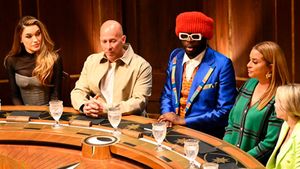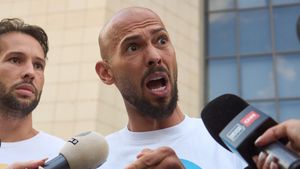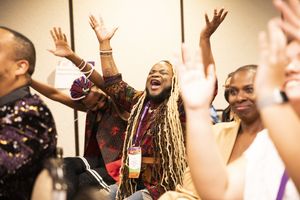
Treatment GuideJust DiagnosedSex & DatingAfrican AmericanStigmaAsk the HIV DocPrEP En EspañolNewsVoicesPrint IssueVideoOut 100
CONTACTCAREER OPPORTUNITIESADVERTISE WITH USPRIVACY POLICYPRIVACY PREFERENCESTERMS OF USELEGAL NOTICE
© 2025 Pride Publishing Inc.
All Rights reserved
All Rights reserved
By continuing to use our site, you agree to our Private Policy and Terms of Use.
Being diagnosed with HIV creates a weird emotional conflict. First, you are told you have this horrible disease, and then five seconds later you're being told to think positively because 'you will live longer than anyone else ever has!' At least that's what my doctor said in a chipper voice the day I was diagnosed. I remember crying and smiling at the time because I was worried he would think I didn't hear him. But the smiling disappeared. I found myself disgusted by my own body. I cringed at the sight of my urine. My own blood was jarring to me. Even though I was by all accounts perfectly healthy, I soon found the mental impact of this experience to be more than I could handle. One day, I was so paralyzed by my own thoughts I couldn't even muster the energy to get out of bed. That was the first time I ever missed work. I was constantly trying to make sense of an issue it seemed the rest of the world had long ago figured out. I watched HIV-positive friends date and form great outlooks on the world. I tried, but I only grew sadder each day. I would wake up feeling drunk and nauseous each morning due to my medication. Each day was becoming more unproductive than the previous. I was exhausted. I once had run seven miles a day, and now I barely went to the gym. My personality was gone. The former me'outgoing and assertive'was now withdrawn and unhappy. I didn't know how to fix it. Mind tired, body weary, spirit a void, I hit rock bottom. I don't recall much from one particular Friday night, but what I do remember is waking up barely dressed, my apartment in shambles, and with the sickening realization that it was now Sunday morning. Seeing the ground littered with broken glasses from my kitchen, the AIDS-related book my sister had made me ripped to pieces. An open bottle of Ambien lay under the bed. It was clear my intention had been to not wake up. I am thankful every day since then that I did wake up. The human mind is so complex in the way it processes feelings, emotions, and the actions that follow. But I do think we can't overlook the need to globally add a layer of emotional care to any treatment plan for HIV and AIDS. How? Well, it requires everyday people to take everyday actions. I think back and wish someone simply asked me how I was doing. I would later find out another friend of mine had a similar experience after diagnosis, and I wish he had shared it early on. It's not as much the disease that impacts the soul and spirit, but rather how we react to it, how we hide it, how we ignore it. People who are uninfected must force themselves to develop a new understanding and compassion for those living with the virus. And every step helps. Even mundane tasks like updating your online profiles, asking each person about their status before sex, or simply getting an HIV test are tasks that remind people HIV is not only very real, but it's also OK. In these moments we have the power to help someone be OK with themselves. Imagine the impact if there were a few less bruised souls and a few more caring spirits. Perhaps it starts by simply remembering that though we as individuals are responsible for our own journeys to happiness, it's OK'and perhaps even our unspoken duty'to care about someone else's.
From our Sponsors
Most Popular
Why activist Raif Derrazi thinks his HIV diagnosis is a gift
September 17 2024 12:00 PM
How fitness coach Tyriek Taylor reclaims his power from HIV with self-commitment
September 19 2024 12:00 PM
Out100 Honoree Tony Valenzuela thanks queer and trans communities for support in his HIV journey
September 18 2024 12:00 PM
Creator and host Karl Schmid fights HIV stigma with knowledge
September 12 2024 12:03 PM
The freedom of disclosure: David Anzuelo's journey through HIV, art, and advocacy
August 02 2024 12:21 PM
From ‘The Real World’ to real life: How Danny Roberts thrives with HIV
July 31 2024 5:23 PM
Eureka is taking a break from competing on 'Drag Race' following 'CVTW' elimination
August 20 2024 12:21 PM
California confirms first case of even more deadly mpox strain
November 18 2024 3:02 PM
Plus: Featured Video
Latest Stories
A camp for HIV-positive kids is for sale. Here's why its founder is celebrating
January 02 2025 12:21 PM
This long-term HIV survivor says testosterone therapy helped save his life.
December 16 2024 8:00 PM
'RuPaul's Drag Race' star Trinity K Bonet quietly comes out trans
December 15 2024 6:27 PM
Ricky Martin delivers showstopping performance for 2024 World AIDS Day
December 05 2024 12:08 PM
AIDS Memorial Quilt displayed at White House for the first time
December 02 2024 1:21 PM
Decades of progress, uniting to fight HIV/AIDS
December 01 2024 12:30 PM
Hollywood must do better on HIV representation
December 01 2024 9:00 AM
Climate change is disrupting access to HIV treatment
November 25 2024 11:05 AM
Post-election blues? Some advice from mental health experts
November 08 2024 12:36 PM
Check out our 2024 year-end issue!
October 28 2024 2:08 PM
Meet our Health Hero of the Year, Armonté Butler
October 21 2024 12:53 PM
AIDS/LifeCycle is ending after more than 30 years
October 17 2024 12:40 PM
Twice-yearly injectable lenacapavir, an HIV-prevention drug, reduces risk by 96%
October 15 2024 5:03 PM
Kentucky bans conversion therapy for youth as Gov. Andy Beshear signs 'monumental' order
September 18 2024 11:13 AM
Study finds use of puberty blockers safe and reversible, countering anti-trans accusations
September 11 2024 1:11 PM
Latinx health tips / Consejos de salud para latinos (in English & en espanol)
September 10 2024 4:29 PM
The Trevor Project receives $5M grant to support LGBTQ+ youth mental health in rural Midwest (exclusive)
September 03 2024 9:30 AM
Introducing 'Health PLUS Wellness': The Latinx Issue!
August 30 2024 3:06 PM
La ciencia detrás de U=U ha estado liberando a las personas con VIH durante años
August 23 2024 2:48 PM














































































